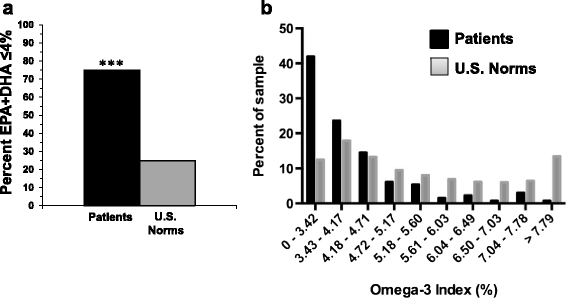Detection and treatment of omega-3 fatty acid deficiency in psychiatric practice: Rationale and implementation
- PMID: 26860589
- PMCID: PMC4748485
- DOI: 10.1186/s12944-016-0196-5
Detection and treatment of omega-3 fatty acid deficiency in psychiatric practice: Rationale and implementation
Abstract
A body of translational evidence has implicated dietary deficiency in long-chain omega-3 (LCn-3) fatty acids, including eicosapenaenoic acid (EPA) and docosahexaenoic acid (DHA), in the pathophysiology and potentially etiology of different psychiatric disorders. Case-control studies have consistently observed low erythrocyte (red blood cell) EPA and/or DHA levels in patients with major depressive disorder, bipolar disorder, schizophrenia, and attention deficit hyperactivity disorder. Low erythrocyte EPA + DHA biostatus can be treated with fish oil-based formulations containing preformed EPA + DHA, and extant evidence suggests that fish oil supplementation is safe and well-tolerated and may have therapeutic benefits. These and other data provide a rationale for screening for and treating LCn-3 fatty acid deficiency in patients with psychiatric illness. To this end, we have implemented a pilot program that routinely measures blood fatty acid levels in psychiatric patients entering a residential inpatient clinic. To date over 130 blood samples, primarily from patients with treatment-refractory mood or anxiety disorders, have been collected and analyzed. Our initial results indicate that the majority (75 %) of patients exhibit whole blood EPA + DHA levels at ≤ 4 percent of total fatty acid composition, a rate that is significantly higher than general population norms (25 %). In a sub-set of cases, corrective treatment with fish oil-based products has resulted in improvements in psychiatric symptoms without notable side effects. In view of the urgent need for improvements in conventional treatment algorithms, these preliminary findings provide important support for expanding this approach in routine psychiatric practice.
Figures


Similar articles
-
Effect of randomized supplementation with high dose olive, flax or fish oil on serum phospholipid fatty acid levels in adults with attention deficit hyperactivity disorder.Reprod Nutr Dev. 2005 Sep-Oct;45(5):549-58. doi: 10.1051/rnd:2005045. Reprod Nutr Dev. 2005. PMID: 16188207 Clinical Trial.
-
Meta-analysis of erythrocyte polyunsaturated fatty acid biostatus in bipolar disorder.Bipolar Disord. 2016 May;18(3):300-6. doi: 10.1111/bdi.12386. Epub 2016 Apr 18. Bipolar Disord. 2016. PMID: 27087497 Free PMC article.
-
Role of Omega-3 Fatty Acids in the Etiology, Treatment, and Prevention of Depression: Current Status and Future Directions.J Nutr Intermed Metab. 2016 Sep;5:96-106. doi: 10.1016/j.jnim.2016.04.004. Epub 2016 May 4. J Nutr Intermed Metab. 2016. PMID: 27766299 Free PMC article.
-
Omega-3 DHA and EPA for cognition, behavior, and mood: clinical findings and structural-functional synergies with cell membrane phospholipids.Altern Med Rev. 2007 Sep;12(3):207-27. Altern Med Rev. 2007. PMID: 18072818 Review.
-
Risk stratification by the "EPA+DHA level" and the "EPA/AA ratio" focus on anti-inflammatory and antiarrhythmogenic effects of long-chain omega-3 fatty acids.Herz. 2004 Nov;29(7):673-85. doi: 10.1007/s00059-004-2602-4. Herz. 2004. PMID: 15580322 Review.
Cited by
-
Importance of EPA and DHA Blood Levels in Brain Structure and Function.Nutrients. 2021 Mar 25;13(4):1074. doi: 10.3390/nu13041074. Nutrients. 2021. PMID: 33806218 Free PMC article. Review.
-
Shared Biological Pathways between Antipsychotics and Omega-3 Fatty Acids: A Key Feature for Schizophrenia Preventive Treatment?Int J Mol Sci. 2021 Jun 26;22(13):6881. doi: 10.3390/ijms22136881. Int J Mol Sci. 2021. PMID: 34206945 Free PMC article. Review.
-
Neurodevelopmental trajectories, polygenic risk, and lipometabolism in vulnerability and resilience to schizophrenia.BMC Psychiatry. 2023 Mar 9;23(1):153. doi: 10.1186/s12888-023-04597-z. BMC Psychiatry. 2023. PMID: 36894907 Free PMC article.
-
Omega-3 nutraceuticals, climate change and threats to the environment: The cases of Antarctic krill and Calanus finmarchicus.Ambio. 2021 Jun;50(6):1184-1199. doi: 10.1007/s13280-020-01472-z. Epub 2021 Jan 27. Ambio. 2021. PMID: 33502683 Free PMC article.
-
Omega-3 Polyunsaturated Fatty Acid Deficiency and Progressive Neuropathology in Psychiatric Disorders: A Review of Translational Evidence and Candidate Mechanisms.Harv Rev Psychiatry. 2019 Mar/Apr;27(2):94-107. doi: 10.1097/HRP.0000000000000199. Harv Rev Psychiatry. 2019. PMID: 30633010 Free PMC article. Review.
References
-
- Brenna JT, Salem N, Sinclair AJ, Cunnane SC. International Society for the Study of Fatty Acids and Lipids, ISSFAL. alpha-Linolenic acid supplementation and conversion to n-3 long-chain polyunsaturated fatty acids in humans. Prostaglandins Leukot Essent Fatty Acids. 2009;80:85–91. doi: 10.1016/j.plefa.2009.01.004. - DOI - PubMed
-
- Barceló-Coblijn G, Murphy EJ, Othman R, Moghadasian MH, Kashour T, Friel JK. Flaxseed oil and fish-oil capsule consumption alters human red blood cell n-3 fatty acid composition: a multiple-dosing trial comparing 2 sources of n-3 fatty acid. Am J Clin Nutr. 2008;88:801–809. - PubMed
-
- Francois CA, Connor SL, Bolewicz LC, Connor WE. Supplementing lactating women with flaxseed oil does not increase docosahexaenoic acid in their milk. Am J Clin Nutr. 2003;77:226–233. - PubMed
-
- Su HM, Bernardo L, Mirmiran M, Ma XH, Corso TN, Nathanielsz PW, et al. Bioequivalence of dietary alpha-linolenic and docosahexaenoic acids as sources of docosahexaenoate accretion in brain and associated organs of neonatal baboons. Pediatr Res. 1999;45:87–93. doi: 10.1203/00006450-199901000-00015. - DOI - PubMed
Publication types
MeSH terms
Substances
Grants and funding
LinkOut - more resources
Full Text Sources
Other Literature Sources
Research Materials
Miscellaneous

